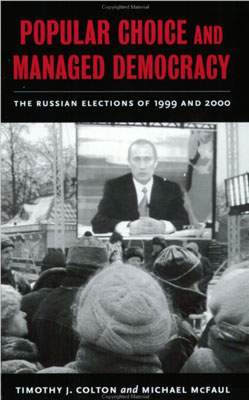Source: Brookings Institution Press, 2003
 Twice in the winter of 1999-2000, citizens of the Russian Federation flocked to their neighborhood voting stations and scratched their ballots in an atmosphere of uncertainty, rancor, and fear. This book is a tale of these two elections—one for the 450-seat Duma, the other for President. The book also demonstrates key trends in an extinct superpower, a troubled country in whose stability, modernization, and openness to the international community the West still has a huge stake.
Twice in the winter of 1999-2000, citizens of the Russian Federation flocked to their neighborhood voting stations and scratched their ballots in an atmosphere of uncertainty, rancor, and fear. This book is a tale of these two elections—one for the 450-seat Duma, the other for President. The book also demonstrates key trends in an extinct superpower, a troubled country in whose stability, modernization, and openness to the international community the West still has a huge stake.
About the Author
Micheal McFaul is a senior associate at the Carnegie Endowment and associate professor of political science at Hoover Institution, Stanford University. He is the author of Between Dictatorship and Democracy: Russian Post-Communist Political Reform and Russia's Unfinished Revolution: Political Change from Gorbachev to Putin.
Timothy J. Colton is professor of government and Russian studies in the Department of Government and director of the Davis Center for Russian Studies at Harvard University. His previous books include Moscow: Governing the Socialist Metropolis (Harvard, 1995), named best book in government and political science 1995 by the Association of American Publishers.
"This is an excellent book, and an unusually valuable contribution to the growing literature on Russian electoral behavior. It brings together the skills and knowledge of two top scholars of Russian politics, and does so in an accessible, crisply written style. It will be a standard source on this election cycle for a long time."
—Thomas F. Remington, Professor and Chair, Department of Political Science, Emory University
"This is one of those rare books that combines policy relevance with the kind of argumentative rigor that will satisfy even hard-core social scientists. Written by two of the West's best known academic specialists on Russian politics, it is almost certain to become regarded as one the best (if not the best) books on the 1999-2000 election cycle."
—Henry E. Hale, Assistant Professor of Political Science, Indiana University





